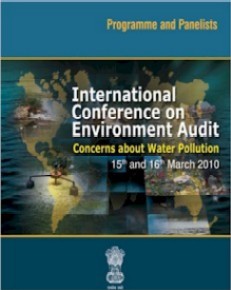/topics/sanitation-and-hygiene
Sanitation and Hygiene
ECO Sanitation - A beneficial toilet
Posted on 13 Sep, 2010 12:27 AMA brochure from Utthan about Eco-sanitation produced with support from Arghyam.
International conference on environment audit - Concerns about water pollution - CAG (2010)
Posted on 10 Sep, 2010 05:15 PM This link on the CAG website provides the details of an international conference that was held on 15-16 March 2010, in the backdrop of the environmental audit proposed by the the Comptroller and Auditor General (CAG) of India, for management and conservation of the environment .
This link on the CAG website provides the details of an international conference that was held on 15-16 March 2010, in the backdrop of the environmental audit proposed by the the Comptroller and Auditor General (CAG) of India, for management and conservation of the environment .
The purpose of this conference was to deliberate on the causes of pollution, action taken by governments and civil society to address this and environmental, management and legal interventions needed to put lakes, rivers and ground water on the path of sustainability.
More than 20 experts on water and water pollution issues were invited to share their views as panelists during the conference. Apart from these distinguished panelists, the heads of supreme audit institutions from countries like Austria, Maldives, Bangladesh and Bhutan were also present to share their experiences regarding audit of water pollution in their countries.
Water Jobs via Devex.com dated September 9, 2010
Posted on 09 Sep, 2010 11:01 AMContent Courtesy: Devex
- WASH Specialist
UNICEF
Location: India
Last Date: 10 September 2010
Sanitation models in Trichy, Tamil Nadu
Posted on 01 Sep, 2010 04:19 PMA few weeks back I had the opportunity to visit a couple of partners in Tamil Nadu. These two partners are facing a difficult task—sanitation and hygiene implementation through community participation. One project is in the urban slums of Trichy while the other one is a rural project a few hours outside of Trichy. These communities have open defecation rates of 90%. The problem mostly lies on the women. Women feel embarrassed and ashamed to go out in the open, so as a result they only go in the early mornings or late at night—basically during pitch black. Menstrual Health is a topic that is only now being addressed with organizations developing their own branch of sanitary napkin production, sold cheaply to women in rural areas. In addition to the burden on women, open defecation pollutes water sources, thereby leading to diarrhea, one of the biggest killers of children in the developing world.
Inspiring progress: Learning from Exnora Green Pammal's solid waste management partnerships in four localities
Posted on 01 Sep, 2010 02:16 PMThis booklet by Exnora Green Pammal (EGP) begins by highlighting the grave situation in relation to solid waste management in the country and the steps undertaken by the government to tackle this issue. The document presents a review of the efforts undertaken by EGP, an NGO based in Chennai, which has been implementing solid waste management projects with a variety of local bodies in accordance with the government’s rules.
India’s solid waste crisis is undermining the nation’s efforts to improve public health, protect the environment and stop climate change. India produces a staggering amount of municipal solid waste every day and the rate of production is expected to climb steadily as the nation becomes more populated, urbanised and economically developed.
Although the Indian government has enacted rules for management and handling of municipal solid waste, the results as per the year 2010 indicate that most localities have not fully complied with the rules and the situation has found to be getting worse day by day. Widespread, prolonged noncompliance with the rules and the rapid, highly-visible environmental degradation has led to calls for a changes in the nation’s waste management policy.
Rainwater harvesting initiatives in Bangalore - A paper by KSCST
Posted on 29 Aug, 2010 12:10 AMThis paper by AR Shivakumar of the Karnataka State Council for Science and Technology (KSCST), presented at a national seminar organised by ISRO at NIAS Bangalore in 2010, begins by highlighting the increasing problem of scarcity of water that the city of Bangalore has been experiencing in recent years and suggests a required plan of action for a sustainable water supply system in the city.
Movie reviews from 'Voices from the Waters 2010' film festival held in Bangalore
Posted on 28 Aug, 2010 08:58 AM
Reviews of some of the movies screened -
“Be water, My friend”
This UNESCO funded film, “Be water, My friend” tracks the research of Professor Gordon Lightgoot, an expert on ancient water monuments as he tries to understand and rectify the alarming drying up of Karez’s in northern Iragi region of Kurdistan.
WaterAid is looking for Manager Technical Support based in New Delhi
Posted on 26 Aug, 2010 01:24 PMContent Courtesy: WaterAid
![]()
Manager Technical Support - Based in New Delhi, India
The package for the position will be around Rs. 9 lakh Gross per annum.
WaterAid is an international non-governmental organisation focused exclusively on improving poor people's access to safe water, improved hygiene and sanitation in developing countries. WaterAid is an equal opportunities employer.
WaterAid is looking for Technical Officer based in Bhubhaneshwar
Posted on 26 Aug, 2010 12:56 PMContent Courtesy: WaterAid
![]()
Technical officer - Based in Bhubaneshwar, India
The package for the position will be around Rs. 6 lakh Gross per annum.
WaterAid is an international nongovernmental organisation focused exclusively on improving poor people’s access to safe water, improved hygiene and sanitation in developing countries. WaterAid is an equal opportunities employer.
Water quality status of historical Gundolav lake - Kishangarh - South Asian Journal of Tourism and Heritage
Posted on 25 Aug, 2010 09:44 AMThis paper published in the South Asian Journal of Tourism and Heritage describes the water quality status of Gundolav Lake in Rajasthan, which was once used for drinking water as well as for recreational activities under the tutelage of the princely state of Kishangarh. This has now become a site of wastewater disposal and facing a critical threat for its sustenance.
Recent years have led to an increasing awareness of the importance of water bodies and the need for conservation of water bodies, especially freshwater wetlands. The Ramsar Convention (2002) identifies wetlands as the starting point for integrated water management strategies. This is because they are the source of fresh water, maintain the health of the water course and water bodies, have the capacity to supply water to meet the human needs and are a key to future water security.





